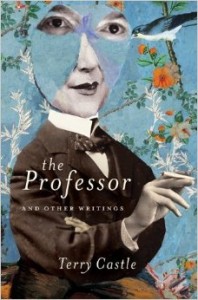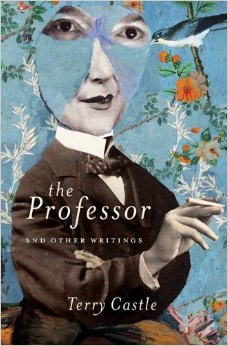 The Professor and Other Writings
The Professor and Other Writings
by Terry Castle
HarperCollins. 352 pages, $25.99
TERRY CASTLE is a professor of humanities at Stanford and an out lesbian with an engaging approach to an eclectic array of subjects. Her better known works include The Apparitional Lesbian: Female Homosexuality and Modern Culture and Nöel Coward and Radclyffe Hall: Kindred Spirits, a brilliant little study of mutual influence between two early 20th-century writers who have each been reclaimed as part of a homoerotic literary past, but who are rarely mentioned on the same page.
The Professor and Other Writings, a collection of previously published essays and a new, jaw-dropping autobiographical piece about a lesbian affair in academia, is as inconsistent as such collections usually are. But the author’s ability to blend her scholarly interests (in the First World War, for instance) with moving details from her personal life and even her ancestry (a British great uncle killed in 1918) offer insights into both her ideas and her life from various angles.
The author describes an uncomfortable childhood in California, where her English parents had emigrated before Terry (named for a distant relative, the great 19th-century actress Ellen Terry) was born in the 1950’s. Her parents divorced in 1961, and her mother was persuaded by her parents to move back to England with her children. In time, however, she brought the family back to San Diego and married a widower with five troubled children of his own. The author’s determination to leave home as soon as possible seems to account for her early academic interests and her escape into the ivory tower, yet her mother and the misfortunes of her stepsiblings are woven through her accounts of her travels and her reading.
The author’s self-deprecating wit and her use of “one” as an occasional substitute for “I” prevent these essays from sounding self-indulgent. Here is a passage from “The Professor,” the story of the author’s affair with a female professor in graduate school in the 1970s: “So who exactly was Terry Castle—now Spoiled Avocado Professor of English at Silicon Valley University—way back in 1975? … Precocious one was, but also foolishly unguarded.”
After meeting “the Professor,” a charismatic specialist in linguistics who had been a folksinger in 1960’s Greenwich Village when Bob Dylan and Joan Baez were fellow travelers, the 22-year-old Terry bravely decides to act on her feelings: “I couldn’t go on, I told myself, without making some decisive move. I needed to shed my passivity; flirt, beguile and disarm with my charm and intelligence. ‘Setting one’s cap at someone’ is how they might have phrased it in the eighteenth century. To fascinate thus I would have to disguise all of my monster-sized insecurities. Likewise block out the absurd and painful truth: that I was a first-year graduate student blatantly pursuing a distinguished (and closeted) senior scholar in my own department.”
The author has mined her journals of the time, and therefore we get a detailed, believable account of the affair that apparently developed with surprising speed before spinning into disaster. The “Professor” in the case is not named, but anyone who was present at the University of Minnesota at the time would probably recognize her. By today’s standards of professional conduct, and even by those of 1970’s lesbian-feminist “sisterhood,” the Professor’s treatment of female students is hard to defend. Yet the author, now a professor who presumably would never treat a student as she was treated, accepts responsibility for her role in a liaison worthy of an opera. Dyke Drama has rarely been this well described.
Other essays in the book include a wry account of the author’s “on-again, off-again semi-friendship” with Susan Sontag, written after her death; a meandering look at the author’s interest in World War I; a study of home-decorating magazines; and a personal response to Straight Life: The Story of Art Pepper (1979), the autobiography of a jazz musician and heroin addict who was once as famous as Charlie Parker.
One of the author’s accounts of trips made with her partner, to whom this book is dedicated, mentions their plan to marry in San Francisco before Proposition 8 recriminalized same-sex marriage in California. Surely this topic is worthy of a future article which, in Castle’s characteristic style, would be both subjective and wide-ranging. Her voice has a timeless, transatlantic quality worthy of the best diarists of past eras.
________________________________________________________
Jean Roberta is a widely published writer based in Regina, Saskatchewan.






